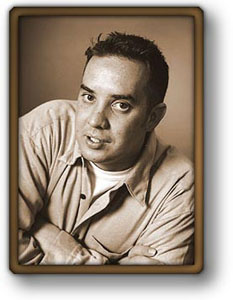In a hot and overpriced room littered with phantom cigarettes (now only for the reckless and rich at $9 a pack; so much for the legal vices) and warm, half-empty beer bottles that he’s hoping will meet his alcoholic needs for the week, a man wearing nothing but boxers and a half-hearted smile sits at a rickety OfficeMax desk that he assembled despite the incomprehensible instructions — written in three languages, none English. He checks his email and RSS feeds. He hopes to hell that he hasn’t pissed off an editor by accident and that maybe that snot in accounting might finally send him the check he needs to make this month’s rent. It was only a few hundred bucks for a review of a 1,200 page biography he wrote four months ago; all told, he probably made just under minimum wage for all the time he put into the piece. He emails pitches to more editors, not hearing back from any of them. He remembers a time when they actually returned emails. But even the nice ones have gone corporate and can’t even be bothered with this professional courtesy. He’s been trying some bastard in the Midwest for a year and a half, but the guy hasn’t even had the decency to write back, “Fuck off.” But when he learns from the RSS feed that the editor lost his job, he pops open a bottle of champagne that he had swiped from one of the literary cocktail parties. He receives many invitations to literary cocktail parties. He’s not sure why. But when he has the time, he attends some of these affairs, telling the bartender that he’s a friend of the author. And if that doesn’t work, he drops a name of a publishing executive. But he generally walks out with a few bottles of gratis, half-decent liquor. And since it’s all tax deductible from the publisher’s perspective, he sees no real ethical conundrum.
He’s sent fifteen or twenty emails to these editors in the last week, offering unique insights on obscure novelists that he believes the public might want to know about. But they want to hire the same aging, burned out midlisters to write about the same books in the same hackneyed way. They always use that damn word “limn,” even when they’re told not to. He even called a few of these editors over the phone. He also said hello to one of these editors at a literary cocktail party just the other night. Alas, the editor was “just swamped” and quickly bolted to the other side of the room. This editor also owes him a check, but the editor swaggered about as if he should be paid for the privilege of being looked at. The man considered tossing a drink, Appointment in Samarra-style, onto this editor’s expensive suit to demonstrate the true meaning of the verb transitive in question, but thankfully thought better of it. After all, his books section would be cut eventually. Just as all the others had.
Section cuts, they say. Or sometimes don’t say, as it turns out. It might help the man if they would at least give him the consolation that he could not write his way out of the green bag he takes to the supermarket because he wants these needlessly belligerent eco-freaks to stop shrieking at him. If they could just be honest and transparent. The way the blogosphere is sometimes, when it isn’t fighting yet another battle against the print people or when the print people are playing the bloggers against each other by hiring some bloggers and not hiring others. But despite the ostensible passion for books that all of them share, they stopped playing fair sometime in 2005.
He wonders whether he should fulminate against these editors on his blog, but then he might not get linked by the humorless woman who runs the blog of a book reviewing organization that he figures should link to him from time to time, given that he pays them $35 a year for the privilege of being bombarded by dire emails announcing “the death of book reviewing” and a vote that will never be counted at their end-of-the-year book awards ceremony. But this woman has never linked to him, nor will she. She lost her passion for books a decade ago, and it’s pretty clear that this listlessness extends into her life in general. (Is this the fate of the book reviewer in the end? he thinks to himself.) But she got the job because there was nobody within the approved coven who wanted to run the blog. It was apparently just too darn hard to upgrade to WordPress. Never mind that they could probably ask the bloggers to do this for them. But that would be beneath their perceived stature.
He is a man of 35, but looks 50. He downloads porn, masturbates on a regular basis, and, in light of recent developments, he has considered switching over to homosexuality just to be sure. Because he is still reviewing books for practically peanuts at an age when a few of his school pals have risen up the ranks to become “self-starters,” with one climbing up to become a menacing partner in a cold transactional law firm, he has not exactly been what women might call “a good catch.” One woman dated him twice, but scurried away when she caught a glimpse of his bank statement. At present it is half-past eleven in the morning, and according to his schedule he should have started work two hours ago. But he has played several games of Minesweeper and even fired up a first-person shooter for a while, suffering a humiliating loss to some teenagers who were not only more adept with the mouse and keyboard than he, but who shrieked crude insults about how gay his playing methods were. He is unmarried, and, unless he can find a sugar mommy, he would likely not be reviewing books if he had a child. When he sets foot outside, his threadbare sneakers crunch on crack vials deposited by friendly neighbors. All part of the neighborhood character, he says to anyone who dares to visit him out here. But they all know damn well he was lucky to get this apartment at this rate, even though nobody else wanted it based on the “unclean” conditions of this city block.
Needless to say this person is a writer. If he still has any literary aspirations, it’s an uphill battle. But he maintains a popular blog, hoping that this might be some small leverage he might use for a book deal. But he never writes fiction. He’s too busy reviewing it. He’s too busy blogging about it. There’s scarcely any time for anything else. A website for a European newspaper has asked him to write a 350 word blog post on an author who died last night. Nobody else had read this author’s books. And he had 30 minutes to bang something out on the keyboard. He fires up Wikipedia, rephrases a few sentences for this piece, tries to “search inside the book” at Amazon to dredge up some example from a book he read fifteen years ago and can’t remember. Nobody reads this blog post.
Do I seem to exaggerate? If anything, the scenario that George Orwell once described has grown tenfold worse. Literature itself may not be dead. It is a zombie legion regularly defying the odds, even as literature is increasingly devalued in our media, our culture, this nation on the whole. The publishers will keep on churning books. But if you’re still in this crazy game — whether as a reviewer or a blogger or a semi-participatory literary acolyte — then you’re certainly not in it for the money.
Of the many solutions that have been presented to overhaul the newspaper scenario, very few account for the most basic of needs. A fair rate to ensure that those who write about books have enough time to spend on the piece without banging off hackery, or that they can use some of the time they need to spend hustling to work on some literary side project. A timely payment of the same funds for the freelancing writer’s most immediate concern: paying the rent. But because newspapers are tanking, because the rates that newspapers pay reviewers have not changed in relation to inflation, who on earth but the most febrile literary enthusiast would lead such a life?
In the first of a two-part post entitled “Hypatia and the Burning Library,” Hart Williams ably pinpointed the problem:
Think about it, the publisher actually SPENT TIME with the writer. It’s almost as though … writing MEANT something. As if the words of a gifted poet and writer were WORTH something, had VALUE, and were worthy of cultivation. If that sounds normal to you, you are sadly off the beaten track. You see, in the 1970s and 1980s, all those book companies were bought up by conglomerates, usually with a movie studio and a record company attached, BOTH of which made so much more money than the publishing arm, that landing as the corporate manager of the poor print arm of Engulf & Devour, Inc. was the corporate equivalent of being sent to an Alaskan Arctic Radar station, or in the old USSR, being sent to Siberia. Those of you who’ve seen the Charles Bukowski documentary will recall Bukowski’s publisher, who went into his own pocket to make sure the poet had money to pay rent, buy cigarettes and alcohol and WRITE.
One can say the same thing of today’s book reviewing climate. Many book review sections are doing the best that they can to keep their sections and maintain some basic modicum. But the conglomerate mentality — ushered in by the Sam Zells (corporate dictator) and Sam Tanenhauses (subliterate corporate sycophant) — has eliminated the ability to develop and to appreciate talent. Mark Sarvas is coaxed to write for the New York Times Book Review, even as the editors contrive a smug and thoughtless takedown in place of a constructive disapprobation. (There are other shenanigans behind the scenes that I wish I could share. But I am sworn to secrecy. Rest assured, the writer — whether she be the novelist or the reviewer — is most certainly valued last at the NYTBR.) Many newspaper sections have certainly assembled fine freelancing ensembles in these days of dying book sections. But if each contributor appears, say, once a month and earns a check that only covers one-third of the rent, is this truly equitable from both the writer and the book section’s perspectives? And since the books editor is under a constant fight to keep her job and her section, things must be played safe, leaving innovation and iconoclasm to be prioritized last.
So some of us find ourselves in safer territory out here in the litblogosphere, knowing that we can write just about anything we damn well please. No editors. But then no word count limits either. Even John Sutherland was forced to confess that “the liveliest opinion and the sharpest exchanges are currently to be found on the weblog.” And while this all feels at times like a happening party, who’s out there to spend time with us and understand us but our peers and the publishers? The publishers want us to write about their books. Our peers, like us, are trying to figure out that immortal formula:
1) Literary blog! Punk rock!
2) ???
3) Profit!
There remains no answer to the question marks in the second item other than some kind of financial support. But by who? Grants? Crazed philanthropists? You certainly won’t find it from the NEA or its puppet spokesman David Kipen, who viewed my WPA-style solution as something vaguely Communist. At the present time, you won’t really find it through advertising, whether for blogs or for newspapers. (And on this point, who can blame the publishers? Let’s say you’re a science fiction publisher. Are you really going to want to place an ad in the NYTBR when they hire an uninformed regular like Dave Itzkoff? When they constantly belittle and disrespect genre?)
And you’re sure not going to find the money in book reviewing, unless you’re one of those freaks happy to dance, pitch, cajole, read, and write like a mad demon.
So we’re left here with a regrettable expanse that might be filled in with a rethinking of our priorities. Or perhaps it might come down to the workers seizing the means of production. To some degree, they already have in the form of blogs. And while I disagree with Sutherland that writing “hastily and thoughtlessly” is without interest (indeed, this impulsive approach to passion is one of the main reasons litblogs took off in the first place), I think Sutherland is write to suggest that we really haven’t gone far enough in what we might be able to do. Are any of us potential John Careys or A.S. Byatts? Is there raw talent that can be transformed into something exceptionally beneficial to the literary scene?
Perhaps it will take the end of newspapers to actuate bloggers into answering these questions. But the key step may be #2. Restoring the worth and the profession of a writer. Figuring out ways to make books matter again. Creating a safety net.
Literary folks, are you up to the challenge?

 Shukert: Jason Priestly and Fred Savage were the two guys on TV who I had big crushes on as a child. I had a picture of Fred Savage in my locker that I cut out from the newspaper. I remember that he was holding a candy box. Like a Valentine’s heart box. And I would pretend that he was holding it for me. And then when I got a little older, I thought Jason Priestly was the handsomest man I had ever seen. I mean, when I say “a little older,” I mean ten. But I had a big poster of him in my room too.
Shukert: Jason Priestly and Fred Savage were the two guys on TV who I had big crushes on as a child. I had a picture of Fred Savage in my locker that I cut out from the newspaper. I remember that he was holding a candy box. Like a Valentine’s heart box. And I would pretend that he was holding it for me. And then when I got a little older, I thought Jason Priestly was the handsomest man I had ever seen. I mean, when I say “a little older,” I mean ten. But I had a big poster of him in my room too.
 Correspondent: Here we have a military strip. But there’s no reference to Iraq. And I wanted to ask you about this kind of balance.
Correspondent: Here we have a military strip. But there’s no reference to Iraq. And I wanted to ask you about this kind of balance. 
 Correspondent: You have this particular rock ‘n’ roll novel dwelling upon Hoboken, as well as Mona Smith, who is this Erica Jong-like figure, who is the mother of Thatcher. But I wanted to ask you about this. Because it’s very fascinating to me. I have the belief that if you write a rock ‘n’ roll novel, there needs to be some additional element. Some additional hook. Because if you dwell too much on rock ‘n’ roll music, well, it’s going to possibly be something of a circlejerk. So I wanted to ask you. Was this a consideration in setting this book in Hoboken? The Hoboken aspect came first? What happened here?
Correspondent: You have this particular rock ‘n’ roll novel dwelling upon Hoboken, as well as Mona Smith, who is this Erica Jong-like figure, who is the mother of Thatcher. But I wanted to ask you about this. Because it’s very fascinating to me. I have the belief that if you write a rock ‘n’ roll novel, there needs to be some additional element. Some additional hook. Because if you dwell too much on rock ‘n’ roll music, well, it’s going to possibly be something of a circlejerk. So I wanted to ask you. Was this a consideration in setting this book in Hoboken? The Hoboken aspect came first? What happened here?